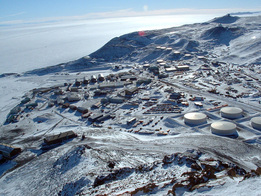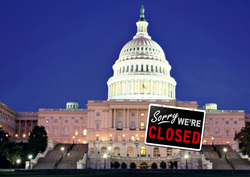|
by Michael Golz '17  McMurdo Research Station in Antarctica, McMurdo Research Station in Antarctica,closed during the shutdown. [image via] The government shutdown was a political nightmare that had dire economic consequences. But there was resounding fallout in research and health studies as well that lead to troubling questions about the place of the public sector in critical scientific endeavors. Among the affected operations was the National Cancer Institute, which had to furlough 80% of its workers and suspend operations such that most new patients looking to enroll in treatment trials were refused (1). The Food and Drug Administration even ceased some food inspections. Drastic results were felt at the Center for Disease Control where although the emergency centers and processing labs were still operational, the organization was working at 30% capacity, with 70% of its workforce sent home (1). The U.S. Department of Health and Human Services reported that “the agency's ability to prepare a response to emerging outbreaks, including the H7N9 flu outbreak or the Middle East Respiratory Syndrome (MERS) outbreak could be delayed (2).” But fear not, standard protocol called for the maintenance of a fully operational National Weather Service (2)…  Oh well, let's go to White Castle. [image via] Oh well, let's go to White Castle. [image via] The effects within universities were not quite as hard hitting, but frustrating nonetheless. We were lucky that the National Institute of Health, the primary source of research funds for American colleges, was at the end of a 3 year grant cycle and thus most researchers did not have trouble accessing already awarded grant money (3). However, new grant proposals were entirely suspended and some labs closed. In some cases, professors and researchers were put back months or years in the research process as government observatories, labs, and research stations (such as McMurdo Station in Antarctica) were closed on the dates they had scheduled to utilize the facilities (3).
0 Comments
Leave a Reply. |
